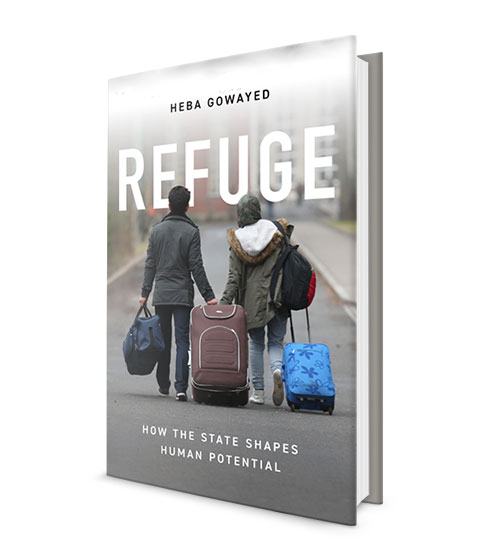(Un)welcome to America
Heba Gowayed examines how America’s refugee system fails desperate people
Heba Gowayed examines how America’s refugee system fails desperate people
President Biden pledged to “welcome” 100,000 Ukrainian refugees displaced by Russia’s invasion. What awaits them? “In all the time that I’ve been studying, working with, and learning from people who are displaced, ‘welcome’ is not the word that they use to describe their experience in the United States,” says Heba Gowayed, an assistant professor of sociology. In her new book, Refuge: How the State Shapes Human Potential (Princeton University Press, 2022), she explains why.
 Refuge is based on Gowayed’s extensive research tracking and documenting the lives of Syrian refugees here, in Canada, and in Germany after fleeing a civil war that has displaced more than 12 million people.
Refuge is based on Gowayed’s extensive research tracking and documenting the lives of Syrian refugees here, in Canada, and in Germany after fleeing a civil war that has displaced more than 12 million people.
The US government demands that refugees become self-sufficient, paying them three months of support, plus welfare, to set them up in their new country. That’s not enough time, says Gowayed, to learn the English necessary to work or take the citizenship exam, let alone pay rent.
So what needs to change? The US should bolster its safety net, Gowayed writes, while divesting from what she calls excessive border security and enforcement.
Gowayed spoke with arts&sciences about her book, the history of our current immigration system, and the implications of trimming border enforcement.
If you are only admitting people who are highly skilled, and you’re not creating opportunities for folks who are dealing with economic adversity in their country, you’re reproducing inequalities.
arts&sciences: What can Ukrainian refugees expect in the United States?
Heba Gowayed: The language that’s being used to receive folks from Ukraine is language of welcome, of warmth, which other refugees have not readily seen. These are not policies that recognize the humanity of people seeking refuge—they fall short of investing in people’s skills and possibilities and in recognizing their personhood.
You make clear in the book that part of that is from our fraught racial history. Given that the majority of Ukrainians are white, can they expect a better welcome?
Their whiteness will protect them from certain aspects. For instance, at the southern border, we had Title 42 [a public health order invoked to block migrants], which denied asylum for hundreds of thousands of people. The logic was to say this was a public health policy because of COVID. The first discretion we saw around that policy was with Ukrainian families.
Similarly, the statement that we’re going to welcome 100,000 Ukrainians is against the backdrop of a decimated resettlement program. The Trump administration gutted the resettlement program on the basis of racism and xenophobia, saying that Syrians are Trojan horses for terrorism. There have been no cases [of terrorism by refugees], but more than that, we don’t hold white people accountable for white supremacist terrorist attacks. I’m not responsible for what another BU faculty member does, let alone for the world’s 90 million Egyptians, which my nationality happens to be.
Canada adopted educational and professional qualifications for immigrants and refugees to plug a labor shortage and minimize reliance on state resources. The Canadian prime minister later said the country wanted a multicultural society. What’s wrong with that?
Indigenous Canadians are not represented in the multicultural image of Canada. There’s also this idea that because Canada is multicultural by law, there’s less racism there, which is not true. Hate crimes against Muslims in Canada and the United States are pretty comparable.
If you are only admitting people who are highly skilled, and you’re not creating opportunities for folks who are dealing with economic adversity in their country, you’re reproducing inequalities.